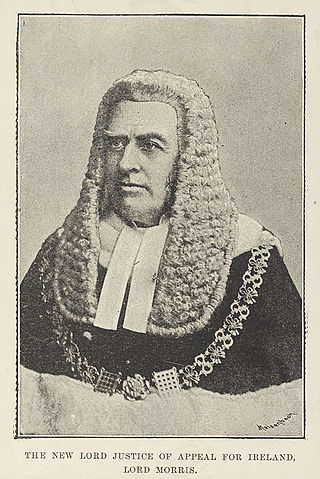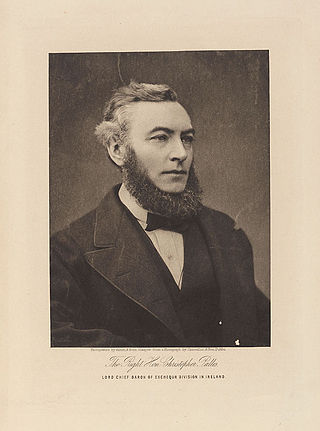
Edward Gibson, 1st Baron Ashbourne, was an Anglo-Irish lawyer and Lord Chancellor of Ireland.

The Attorney-General for Ireland was an Irish and then United Kingdom government office-holder. He was senior in rank to the Solicitor-General for Ireland: both advised the Crown on Irish legal matters. With the establishment of the Irish Free State in 1922, the duties of the Attorney-General and Solicitor-General for Ireland were taken over by the Attorney General of Ireland. The office of Solicitor-General for Ireland was abolished at the same time for reasons of economy. This led to repeated complaints from the first Attorney General of Ireland, Hugh Kennedy, about the "immense volume of work" which he was now forced to deal with single-handedly.

Sir John Pratt (1657–1725) was an English judge and politician. He was Lord Chief Justice of England from 15 May 1718 until 2 March 1725. He was appointed as an interim Chancellor of the Exchequer on 2 February 1721 until 3 April 1721.
Hervey de Stanton was an English judge and Chancellor of the Exchequer.

Christopher Palles was an Irish barrister, Solicitor-General, Attorney-General and a judge for over 40 years. His biographer, Vincent Thomas Hyginus Delany, described him as "the greatest of the Irish judges". He served as the last Lord Chief Baron of the Exchequer from 1874 until his retirement from the bench in 1916.
The Recorder of Dublin was a judicial office holder in pre-Independence Ireland.

John Hoadly was an Anglican divine in the Church of Ireland. He served as Bishop of Ferns and Leighlin, as Archbishop of Dublin, and as Archbishop of Armagh from 1742 until his death.
The Lord High Treasurer of Ireland was the head of the Exchequer of Ireland, and chief financial officer of the Kingdom of Ireland. The designation High was added in 1695.
Stephen Woulfe was an Irish barrister and Whig politician. He served as Solicitor-General for Ireland in 1836 and as Attorney-General for Ireland in 1838. He was the first Roman Catholic to be appointed Chief Baron of the Irish Exchequer. He died young, due to a combination of chronic ill-health and overwork.

Henry Ussher was an Irish Protestant churchman, a founder of Trinity College Dublin, and Church of Ireland Archbishop of Armagh.
The Lord President of Connaught was a military leader with wide-ranging powers, reaching into the civil sphere, in the English government of Connaught in Ireland, in the sixteenth and seventeenth centuries. The office was created in 1569, and in 1604 was reconstituted with full powers to hear all civil suits, to impose martial law and to proceed with "fire and sword" against the King's enemies. The width of his powers gave rise to clashes with the longer established courts: in 1622 he and the Lord President of Munster were ordered not to "intermeddle' in cases which were properly within the remit of those courts. He was assisted by a council whose members included the Chief Justice of Connacht, one or two associate justices and the Attorney General for the Province of Connacht. The office was abolished in 1672.
David Richard Pigot, PC, KC was one of the leading Irish judges of his time. His children included John Edward Pigot, a noted music collector and one of the founders of the National Gallery of Ireland. His grandchildren included the Australian astronomer and Jesuit Edward Pigot.
Sir Humphrey Winch (1555–1625) was an English-born politician and judge. He had a distinguished career in both Ireland and England, but his reputation was seriously damaged by the Leicester witch trials of 1616, which resulted in the hanging of several innocent women.
John Egan (1750?-1810) was an Irish barrister, politician, and chairman of Kilmainham, County Dublin.
Sir Stephen Rice (1637–1715) was Chief Baron of the Exchequer in Ireland and a notable supporter of James II.
Robert Tracy (1655–1735) was an English judge.
Henry Burnell was an Irish judge and politician; he served briefly as Recorder of Dublin and as a justice of the Court of King's Bench. Though he was willing to accept Crown office, he spent much of his career in opposition to the Government. He was one of the leaders of the protest against the policies of the Lord Deputy of Ireland Sir Henry Sidney in the late 1570s, and as a member of the Irish House of Commons in the 1580s he successfully opposed Sidney's successor, Sir John Perrot. In the early 1600s, he was one of the leaders of the protest against strict enforcement of the Penal Laws. His professional reputation was gravely damaged in his later years by a verdict that he was guilty of forgery, when he was convicted and fined for having altered a deed concerning the inheritance of the 11th Earl of Kildare's estate. He was the grandfather of the playwright Henry Burnell.

Sir William de Essendon, de Estdene or Eastdean was an English-born cleric, lawyer and Crown official, much of whose career was spent in Ireland in the reign of Edward I of England. He served twice as Lord High Treasurer of Ireland, and had a high reputation for integrity and efficiency.








